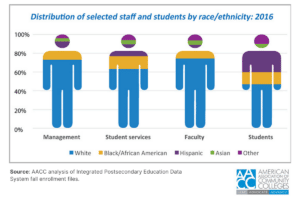Community college administrators and leaders gathered virtually at the end of last month for the two-day Equity Institute, an opportunity to build on their commitment to exposing and tackling equity challenges. The institute focused on implementing equity-minded leadership and antiracism principles in institutional equity efforts.
Leaders discussed at length how colleges can move from conversation to action, including equity-centered methods for hiring faculty and staff. Broward College, Central Carolina Community College (CCCC), and Hudson County Community College (HCCC) are currently engaging in difficult yet crucial conversations to redesign their respective hiring and onboarding practices, and they presented their road maps at the Equity Institute.
Representatives from HCCC spoke about centering race in faculty and staff hiring. The college established the President’s Advisory Council on Diversity, Equity, and Inclusion (DEI) in 2019 and developed a human resources (HR) action plan which focuses on four goals:
- Supporting an inclusive culture of care, creating DEI infrastructure, training programs, and initiatives across the college.
- Weaving diversity, equity, and inclusion guidelines and practices into recruitment and hiring practices, screening committee procedures, promotion considerations, and succession planning.
- Creating clear and transparent processes for safety, security, and incident reporting that are free of intimidation and respectful of confidentiality.
- Building community and a sense of belonging for students by advancing their academic development, professional growth, and personal transformation.
To continue this equity-centered work, the college also shared their new HR website with institute attendees. They explained the importance of including a representative array of HCCC members from diverse backgrounds on their hiring committees and using DEI checkpoints to allow consideration of candidates from traditionally underrepresented groups.
Another example of equity-centered work is taking place with the support of the North Carolina Student Success Center’s Equity and Pathways Program, whose work centers around providing holistic student-centered supports. Director Jairo McMican discussed the biases that arise when staff are conducting hiring searches.
When conducting interviews, Mr. McMican highlighted that it can be beneficial to incorporate the Implicit Association Test (IAT). IAT is a tool that can assess multiple types of implicit discrimination, employing explicit measures which assess mental representations outside of conscious control. Mr. McMican also explained that everyone has biases and many of them are unconscious and ingrained. To address these, HR departments can create a rubric that uses an equity-minded approach to replace structures, process, and resources with those that are more inclusive.
Inequities persist because they are ingrained in the operations and traditions of an institution. Many colleges acknowledge that the numbers of underrepresented minority faculty on their campuses continues to remain small. Students often do not see themselves reflected in their professors because faculty and staff are less diverse than the student populations attending community colleges.
The same components necessary for establishing an equity-centered institution are also essential when hiring faculty and staff. Along these lines, ATD is developing an equity implementation toolkit to provide a guidepost for institutions who are committed to pursuing equitable outcomes and instituting equity-minded hiring practices. ATD’s eight equity principles, which will be included in the toolkit, address how to serve students holistically, embrace cultural competence and culturally responsive pedagogy, drive equity-minded change, and leverage data to inform equitable student outcomes.
By engaging with the public to ensure social and economic mobility, colleges can strive to diversify their workforce. They can foster equitable hiring committees which can include not only faculty and staff but also students.
Culturally responsive rubrics for search committees can incorporate processes that allow for the dismantling of biases toward gender and race. Broward College has established an equity-centered process for hiring full-time and part-time faculty. This effort shapes position description, search committee preparation, application and review process, and evaluation of the candidates. It can create more equitable experiences for Black, Latinx, Asian and Indigenous candidates. The process can also lead to the creation of a more gender-diverse and neurodiverse workplace.
We would love to hear from your institution about ways you are incorporating equity-based practices for hiring faculty and staff. Please contact us with your ideas.
